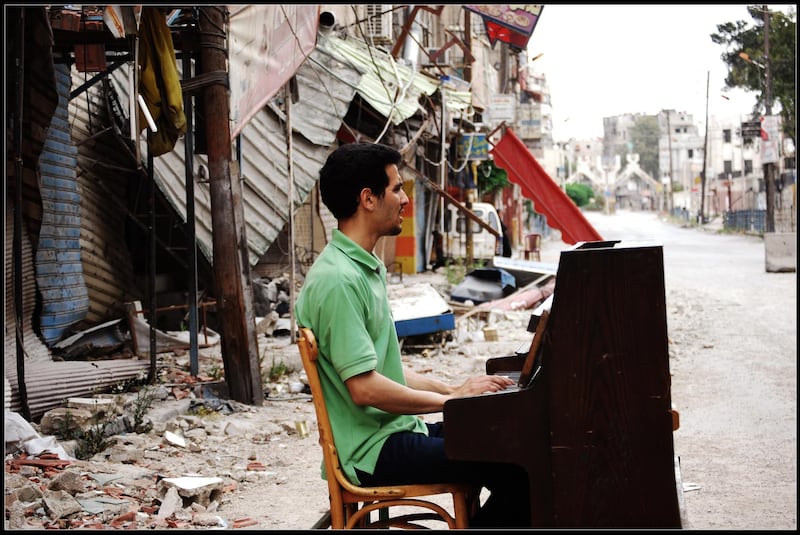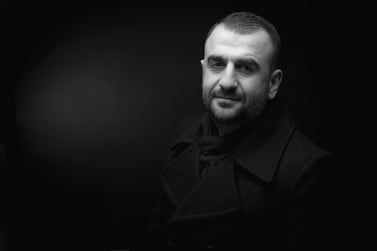An image of Aeham Ahmad taken in 2014 turned him into an unlikely celebrity. Sitting in a wooden chair with his back straight, he stoically plays a piano while surrounded by wreckage in Yarmouk, his home and a place destroyed by the conflict in Syria. The image seemed to offer a glimmer of hope and resistance amid the war, which has killed more than 500,000 people.
Ahmad became known as the “Pianist from Syria” and videos of him playing have been viewed hundreds of thousands of times on Facebook and YouTube. In the clips, he also talks about the lack of water and begs for aid to be sent to the area.
As a result of having played elegiac music in his videos online, mournful and bitterly satirical songs that were directed at the Syrian government, Ahmad, 31, now lives as a refugee in Wiesbaden, Germany, alongside his wife and two children aged four and seven.
'I wanted to end the war with this music'
Ahmad tells The National that he is still overwhelmed by the response to his story. In 2015, he was given the International Beethoven Prize for Human Rights and performed his Songs of Yarmouk at a chamber concert in Bonn. Ahmad says his story probably struck a chord with people across the world because "when you kill all life, the music will still live".
“The image is so powerful because everybody knows what the piano is,” he says. “They know it symbolises music. I wanted to end the war with this music. That was my hope.”
In his autobiography The Pianist From Syria: A Memoir, which he wrote with journalist Ariel Hauptmeier and translator Sandra Hetzl, Ahmad describes Yarmouk before the war as a thriving community made up of "patchwork-like settlements".
His father, who was blind from a young age, fled Palestine during the Naqba of 1948, and his love of music led him to run a shop full of guitars, violins, pianos and about 200 ouds. His appreciation of music was passed on to his son, with Ahmad studying music pedagogy at Al Baath University in Homs. He also enjoyed riding his bike around Yarmouk, once home to 160,000 people. But in 2012 everything changed, and 18 days after the birth of Ahmad’s first child, Syrian Army tanks rolled through Yarmouk.
A few months later, the shelling started, with bombs hitting Ahmad’s old middle school and the clinic where his child was born. The city was then completely sealed off, with no water, food or electricity, and was besieged by the Syrian Army as they hunted for rebel forces.
Ahmad was almost stopped from playing piano when a grenade exploded next to the falafel stand he was working at, leaving two fingers on his right hand hanging off. A carpenter, who was filling in as a surgeon at the makeshift hospital, sewed Ahmad’s hand back together and he was able to play again.
Why he decided to play the piano
Ahmad explains in his autobiography that he came up with the idea of playing the piano amid the wreckage of war as a way to protest against the actions of President Bashar Al Assad’s regime. Appalled at the carnage around him, he says he wanted to “counter violence with art”. He was joined by some friends, who helped him wheel a piano into the street.
Once in position, Ahmad began to play. A friend filmed the performances and uploaded the video to Facebook and YouTube, after which CNN and the BBC ran profiles on the Pianist from Syria. The image that made him a celebrity was taken by photographer Niraz Saied, who was later captured by the Syrian Army. Saied died in jail last year, a loss that weighs heavily on Ahmad’s mind.
“The whole idea was to put people’s attention back on Yarmouk, so they did not forget about it,” Ahmad says. “People began to translate the songs and they understood what I meant. I would say to people that if you don’t know what you can do to help, please share this video. People began to realise we did not have food or water and gave support to the UN children’s fund, and help started to arrive.”
But the killing continued, and a young girl named Zainab was shot dead while singing in the street with Ahmad. The musician still feels guilty about her death, and as though he has broken a promise he made to the children of Yarmouk. “When I see my children and how they have grown up, I think I left all the children in Yarmouk – I broke my promise that I would stay with them and we would sing together forever,” he says.
In April 2015, ISIS took control of Yarmouk and burnt Ahmad’s piano because the group declared it illegal to have musical instruments under their interpretation of Sharia law. Ahmad and his family tried to flee, but they were arrested by the Syrian Army. Ahmad sent his family to Damascus and continued the journey out of Syria alone, travelling to Turkey before paying a smuggler to take him to Greece by boat.
A BBC journalist who was following his journey lent Ahmad a camera to film his travels across the water, and the remarkable footage shows him hugging an Iraqi man aboard the dinghy as they make their way to Greece.
By September that year, Ahmad had reached Vienna, where he was granted refugee status. He began a new life in the Austrian capital, playing a number of concerts a year, before moving to Germany. He does not know when he will return to Syria – his family home and their music shop were destroyed in the fighting – and he hopes the conflict will end soon.
“My story is not unique and I recently met a man from Aleppo whose whole family died on the boat to Europe,” Ahmad says. “Can you imagine how he feels?” Ahmad is bitter towards those whom he feels are responsible for the Syrian conflict.
“The lives of a lot of people have been destroyed in the interest of politics and money and selling weapons,” he says. “The attitude is that we don’t care, we sell you the weapons, or Russia sells the weapons – they don’t care about the people. If you’re selling weapons, you should accept the refugees that come as a result.”






